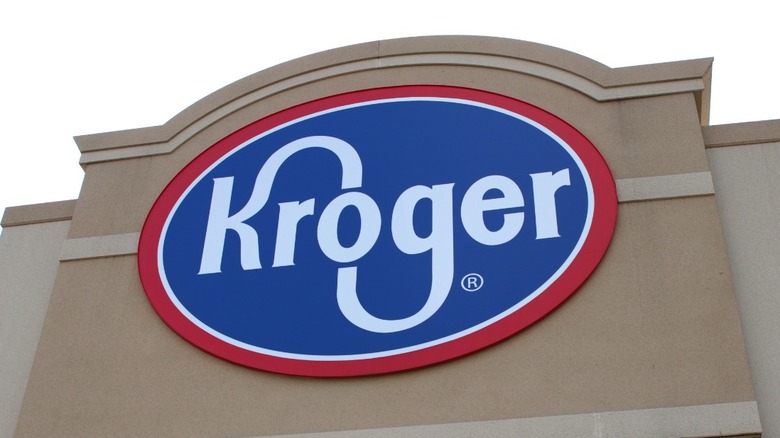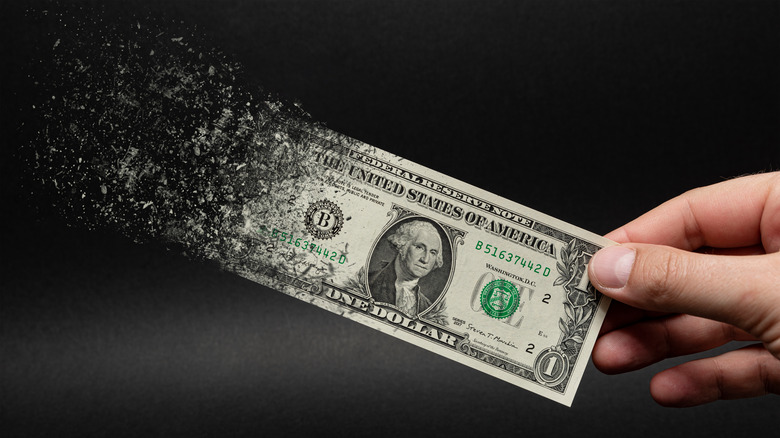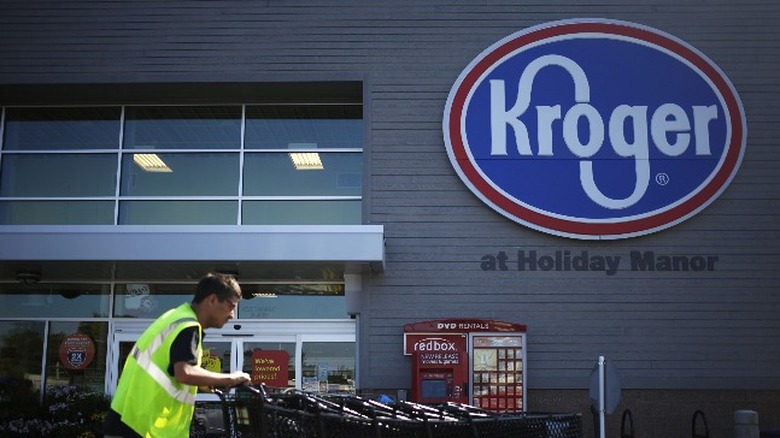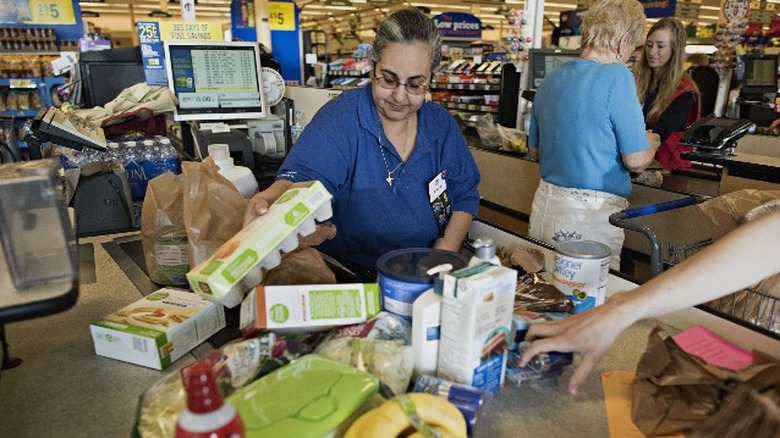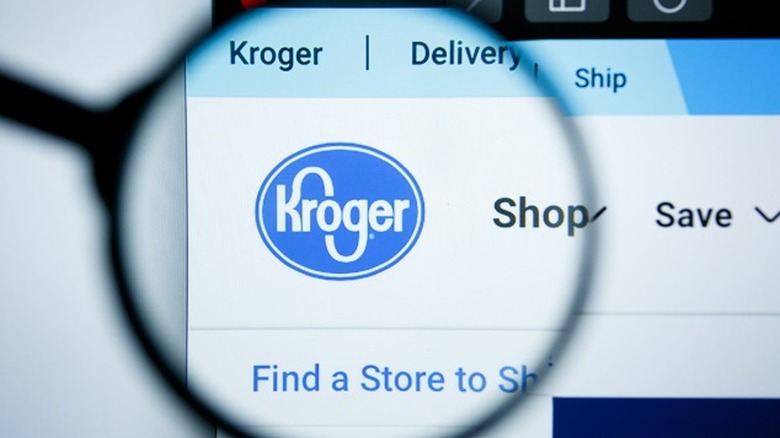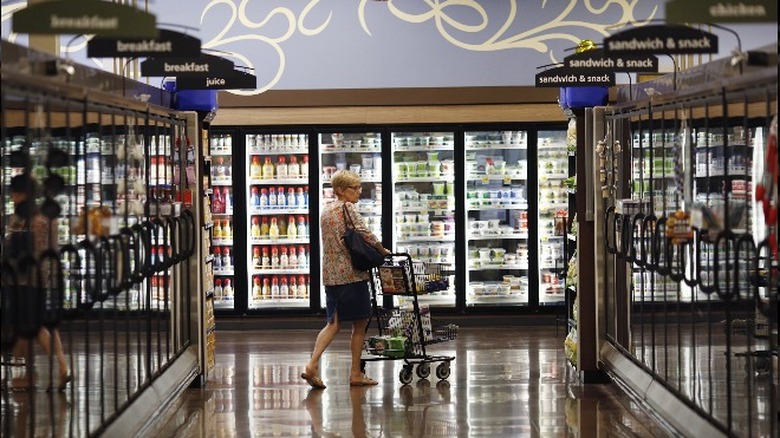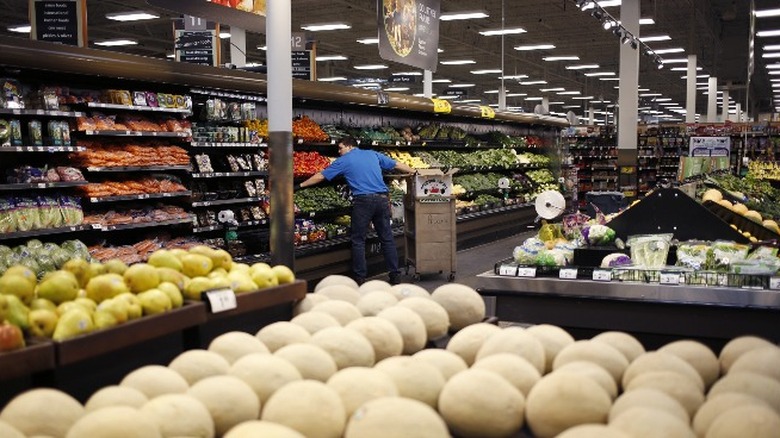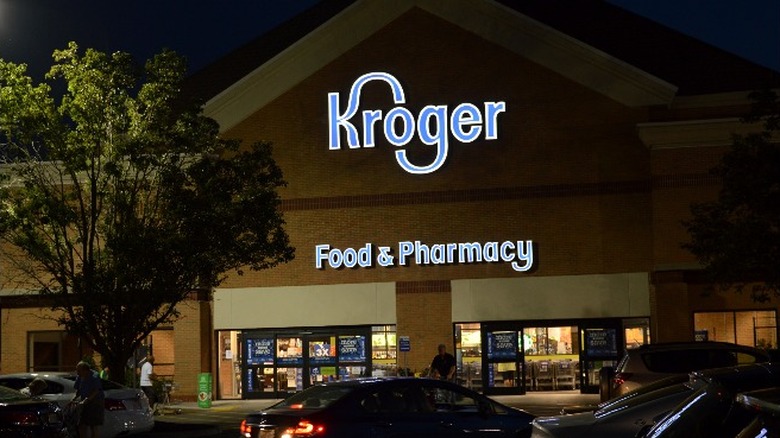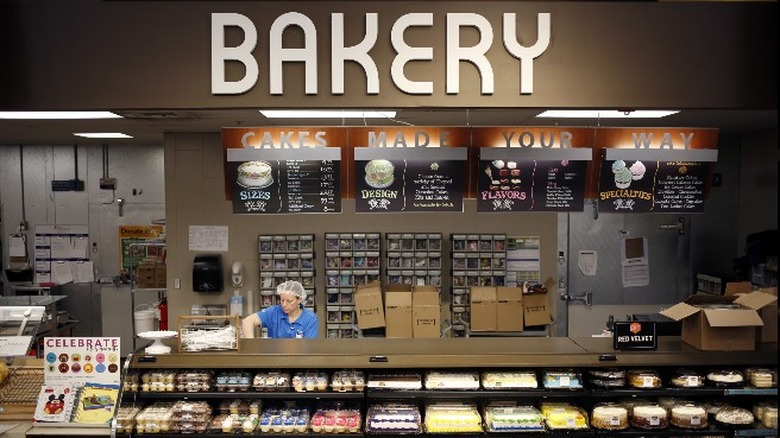Workers Reveal What It's Really Like To Work At Kroger
When it comes to customer experience, Kroger is king. A 2022 report by online management company Qualtrics has the stats to prove it. Customers are happy with the store, but how is the employee experience at Kroger (and Kroger-owned stores like Fred Meyer, King Soopers, Smith's, etc.)? The Cincinnati-born grocery chain employs 465,000 workers in 2,742 stores across the US (via Macrotrends and Statista). Though the chain added social distancing policies and asked for its workers to be classified as emergency personnel to try to protect them during the first phase of the COVID-19 pandemic, it doesn't always seem to act in its workers' best interest.
For example, in 2021, Kroger shut down seven stores in Los Angeles, Seattle, and Long Beach, The Guardian reports. The closure of stores in each of these locations came right after hazard pay ordinances (an extra of $5 per hour for all its employees in LA and $4 per hour in Seattle and Long Beach) were passed in the three cities, and the closures were viewed by employees as a way for the company to avoid paying higher wages. Clearly, working at Kroger has its ups and downs. Here's what the employees have to say about working at this Fortune 500 company, both good and bad.
The pay isn't great
Kroger is the largest grocery chain in the United States, so it would pay well, right? Wrong. As it turns out, the over-a-century-old grocery chain pays less than some of its competitors. Kroger did increase its average hourly wages from $15 to $16.25 in 2021, still less than Costco's $24-an-hour average, according to The Guardian. Some employees are clearly still not satisfied with the pay. More than 8,000 workers showed it by organizing a three-week protest in Colorado in 2022 demanding better wages. The striking workers were all employees of Kroger-owned King Snoopers grocery stores and members of the United Food and Commercial Workers union.
One of the employees, Kenny Sanchez, who was part of the strike, said, "We're not making a living wage. We have people living out of their cars and struggling to pay bills ... This company does not get it. We can't survive on what they're paying out here and the competition is paying more." The employees also weren't happy with the company hiring temporary workers to replace unionized labor.
The low pay has real effects on the lives of Kroger workers. A study published by Economic Roundtable showed that 14% of the chain's employees experienced homelessness in 2021, and 78% were food insecure
Schedules are sometimes changed on short notice
For some employees, their work schedule is a cause for stress — the hours are erratic, and every day is different. A study based on a survey of over 10,200 Kroger employees revealed that a majority of them didn't have a fixed schedule. In fact, for a quarter of the employees, the news about schedule changes was conveyed the same day or one day beforehand (via Economic Roundtable).
With schedules as unpredictable as a lottery win, hourly workers (not just at Kroger) often struggle to achieve any work-life balance or spend time with family and friends, per a report published on Center for Policy Initiatives. The report was based on a survey of 2,800 hourly workers in San Diego county. The workers said that employers cared little about their rest time and that if they ever did bring up a request for a schedule change there were often retaliations.
While unpredictability is one thing, the Economic Roundtable survey also found that about three-quarters of Kroger employees feel that there are not enough workers at their stores. Many think of their stint at Kroger as just a short-term job and not as a career opportunity. The turnover rate at the chain is quite high — it has increased four times since the beginning of the pandemic.
The work can get a little overwhelming
Nobody likes to be buried in extra work. A quick scan of the comments posted by Kroger employees on Reddit conveys that there is little time to gossip around the water cooler. One employee wrote: "Does anybody feel that working with this company has been WAY overwhelming? I mean ... I'm so grateful that I have a job. But I feel underappreciated all the time. Like nothing is ever good enough with this company" Another employee added, "My mental health is terrible and I'm suffering at this job I can honestly tell you I've never wanted to cry so bad in my life."
According to Comparably, a platform that compares organizations based on employee reviews and customer ratings, Kroger is in the bottom 20% in office culture and employee happiness compared to similar companies. About 64% of the over 1000 employees who took time to rate the company said they felt burnt out at work and 81% said they would leave the job if another employer gave them a 20% pay hike. Money matters for sure, but according to the Economic Roundtable report, three-quarters of the employees report feelings of depression and anxiety brought on by reasons including a lack of support from store managers when dealing with difficult customers, bias and favoritism at work, and low pay. Having said that, a majority of them take pride in what they do.
Break rooms aren't always comfortable
Whether an employee can comfortably sit and eat their lunch in a break room depends on the store. According to posters on Reddit, some Kroger store break rooms are small and unhygienic, while others are huge with "2 couches, a TV, 2 tables, a fridge, 4 vending machines, a Keurig, a toaster, a microwave, and lockers."
The pandemic changed the break rooms at some Krogers, with management encouraging employees to social-distance instead of taking their breaks crowded together in the same cramped room. A Kroger employee told Reddit, "The managers said, 'take your break in your car.' Umm like 50% of our employees do not own cars ...i s it illegal to not provide a space to take your break? Are we supposed to eat standing up in a cluster? We have many employees that are old/disabled and need to sit." In another Kroger store, "they allowed 3 people in the break room, so they set up 3 small tables in a checkerboard pattern," wrote an employee.
To maintain a healthy work environment, CDC, among other guidelines, had suggested removing some of the chairs in break rooms and finding alternative places to take breaks so employees could spread out. It seems that some Kroger stores took that advice a little too far, leaving a sea of room for social distancing and zero room to sit and rest.
Kroger's hazard pay lasted for less time than other supermarkets'
While the pandemic had some people hunkering down at their homes and watching reruns of "The Office", Kroger employees, as well as, staff at other supermarkets, were keeping the retail machine running while risking their own lives. As a token of appreciation, Kroger launched a "hero bonus" program which gave employees an extra $2 per hour for a limited time of two weeks. Though it was extended by a few weeks, the duration of the bonus program was still shorter than what other supermarkets had in place, per Eater.
The temporary pay increase wasn't the only pandemic perk for employees. They also received $1 bottles of Pepsi products. The employees appreciated the cheap soda, but what they really wanted their company to do was extend the $2 extra pay for longer (via Business Insider). It must also be mentioned that before implementing "hero pay," the company's first idea for saying thank you was a $25 grocery coupon. Kroger then followed that with $300 bonus for its full-time employees and $150 for part-time employees (via Kroger).
After "hero" pay ended, the company sent out another round of one-time bonuses. During this period, it paid some employees more than it intended to. Per Eater, Kroger first asked the employees to pay the extra money back, but later said repayment was not required.
Not all employees follow the dress code
Kroger asks its employees not to wear clothes, hats, or masks with logos, words, or abbreviations (via Zippia). They are also supposed to wear a Kroger-supplied blue apron at all times. But who is watching? According to some Kroger employees, there are no strict dress code watchdogs at the store. One employee told Reddit, "I can see most employees I see every day not following the rules of our dress codes like I see my supervisor is wearing jeans with holes and other employees wearing large logos on their hoodies which you're not supposed to." Another employee chimed in saying employees in their store, as well, wore clothes with big logos and hats endorsing a certain sports team.
The Reddit thread indicates that employees seem pretty lax about sporting Kroger's blue apron as well; some call it a workplace hazard. As one employee wrote, "It (the apron) led to me getting stuck on something and almost crushed between 2 incoming rickety pallets" The apron, in the past, has also brought in some legal trouble for the grocery chain. In 2019, Kroger introduced aprons with a colorful embroidered heart on them as part of its dress code (the heart may symbolize Kroger's corporate values). Two employees refused to wear it, saying that the heart promoted LGBTQ pride and didn't sit well with their religious beliefs. A lawsuit was filed against Kroger after the company fired the two for not abiding the dress code.
Your sleep schedule can take a hit
Some Kroger employees get so little time between their shifts that they can't always sleep a full night. One of them wrote on Reddit, "Tomorrow I'm scheduled for 3 PM-11 PM, and then the next day 7 AM-1 PM, is this even legal? This doesn't even allow 8 hours of sleep!"
Yep, it is legal. There is no law that requires companies to give a minimum number of hours between shifts for employees (via Chron.). However, there are some states that require employers to pay extra to those who work two or more shifts in a single day. According to some Kroger employees, the company pays extra if the gap between shifts is less than 10 hours. "We're required a minimum of 10 hours between shifts and all hours that don't fall within that are counted as 1.5x our hourly wage (overtime). For example, if you're scheduled with only 8 hours between a shift, the first two going into the next are overtime. The remaining are straight time," wrote an employee on Reddit.
Despite the toll sleep deprivation can take on their health, some are happy to work split shifts for the extra pay. Another poster on the Reddit thread said, "This upcoming week I've got 6 hours between 8-hour shifts. Plus I'll be subbing in for the Vendor Receiver (so relief pay too) ... so that 8 hours of overtime is going to hurt their precious statistics :), but it'll pay nicely."
Kroger encourages its employees to get vaccinated
The topic of vaccination has been a hot potato for a while now. The proposed vaccine mandate for employers with over 100 workers was struck down in a Supreme Court ruling. Despite the lack of a government mandate, many organizations, including Kroger, encouraged employees to take the COVID-19 vaccine. The chain gave away $100 to those who got vaccinated.
Kroger also introduced some penalties for unvaccinated employees. None of the unvaccinated employees are eligible for Kroger's special paid leave for COVID-19, though they can still use their normal sick days if they become ill. Salaried employees who are enrolled in the company's healthcare plan are required to pay a $50 health insurance surcharge if they remain unvaccinated, writes U.S. News & World Report. Employees who are part of the union (nearly 66% of Kroger's workforce) and hourly employees are exempt from paying the fee.
Korger is not alone in incentivizing vaccination among its workers. Other companies that also introduced similar surcharges for their unvaccinated employees include Delta Airlines, JP Morgan Chase, and grocery chain Harmons. Some others like United Airlines and Google threatened to fire the employees who refused to get vaccinated (via Fortune).
Some customers can be annoying
Know that whenever you leave your tub of butter in the chip aisle in Kroger, it irks the employees at the store. And as it turns out, customers misplacing things all around retail stores is a common enough phenomenon to deserve its own subreddit. An associate at Kroger said on Reddit, "I've seen people leave milk on a 3 tiered basket that was maybe 10 feet from the dairy cooler, instead of in said cooler." Another employee wrote that when they asked a customer to not stuff items in the wrong aisle, they "got mad and complained to the management."
Employees also get vexed when customers try to teach them how to bag the groceries (via Reddit). Other employees complained about customers who decide to not buy something at the last minute. Also on the "annoying" list are also those who refuse to place the carts back in the corral and those who are always playing treasure hunt in their wallet — "people that don't get their money ready while I am waiting but instead wait until the very end and then proceed to take 2-3 minutes to dig out change and hand me crumpled up bills," (via Reddit).
The training isn't that intense
Though Kroger seems to be investing a lot in training its employees — building large training centers (via Shelby Report), setting up a full-fledged culinary institute (via Supermarket Perimeter) and launching an online program with personalized training modules, not all employees feel equipped to start ringing in items on their first day at work. Said an employee on Reddit, "I've been in the bakery for two months and feel like I have no clue what I'm doing half the time. Maybe the other departments are better but I had almost no training besides the tons of videos I watched that aren't relevant to my job."
The training, as mentioned on Kroger Forum, has in the past included two sections: "Intro to Kroger" and "Connecting with Customers." These classes are sometimes taught at various regional training centers. Employees say the training is not relevant or helpful to handling the real challenges at the store. One of the employees called the training a "joke," and another said, "Kroger training method is usually just throw you to the wolves and hope for the best. When I started I got to shadow an old cashier for a while, but then the store got busy so I was left with just the bagger to help me out" (via Reddit).
The overnight shift is physically demanding
Going by Kroger employees' comments on Reddit, working the overnight stocking shift has pros and cons. Employees have to pull an all nighter, but they also get paid extra; there is a lot of heavy lifting do, but they get to do it in the quiet. According to an employee on Reddit, QFC and Fred Meyer — both Kroger owned companies — pay as much as $22 an hour for night-shift employees. That's high compared to the company's average pay. Though the pay varies according to the store, in general it is on the higher side — per WDRB, anyone working the overnight shift in Louisville got an extra $1 an hour by default. The company has had to increase the night wages to encourage more employees to join.
While the money is good, one overnight shift veteran on Reddit warned, "You have to be mentally prepared. Stay out of the drama, ask questions, stay busy. Once you get comfortable with where product is located you'll be a lot faster. Takes your body time to adjust to the physical labor aspect, but muscle memory will come in time." Another perk is that "You don't have to deal with customers your entire shift."
Sometimes bakery staff get free desserts
Working in the bakery at Kroger isn't easy. Sure, you get to spend an entire day surrounded by the smell of warm cookies and bread, but it's also a lot of work — and not the kind that pushes you to handle icing spatulas like "Cake Boss." It's more likely that you'll be asked to heat frozen bakery items with precision.
A bakery manager at Kroger told Reddit that they start their day at 4 am by with baking the bread, turnovers, muffins and pies; proofing the bread and rolls; and preparing the donuts — all by 6 am before the store opens. If you are on the closing shift, wrote another Kroger baker, you have to set up donuts for the morning, clean the floor, slice breads, and update the markdowns. But hey, you can get a free donut for your troubles. Per an employee on Reddit, "I usually get to snack on any food that is missing a label or won't be put out for sale due to the quantity of the item being inaccurate or the quality too damaged. My cake decorator also has allowed me to eat slices of cakes/cheesecakes that she was going to throw out due to its shelf life being up (they're still just as good as when it's put in)," added the employee.
